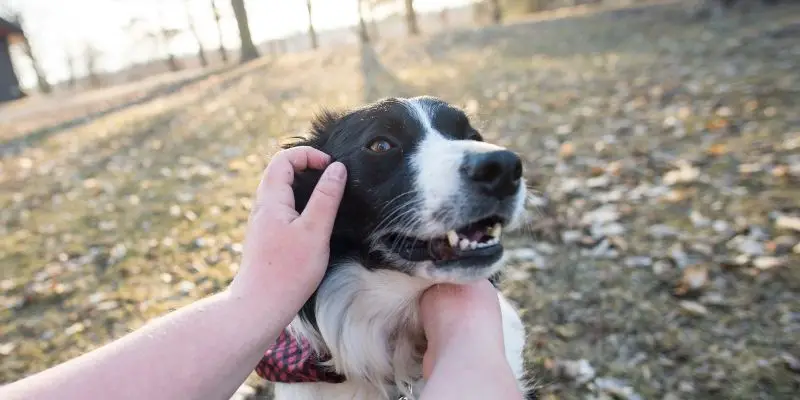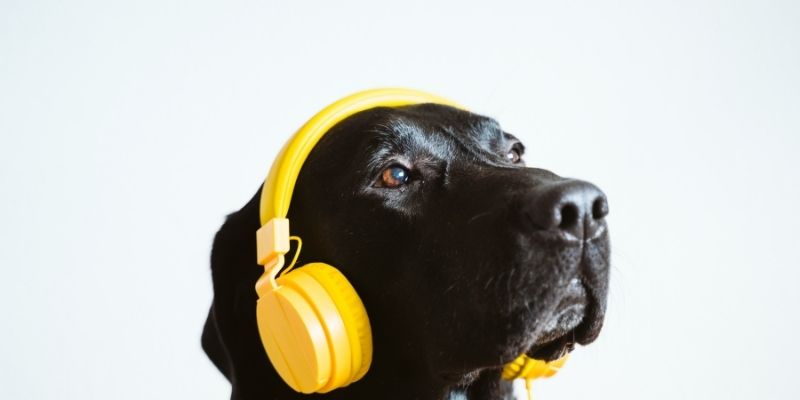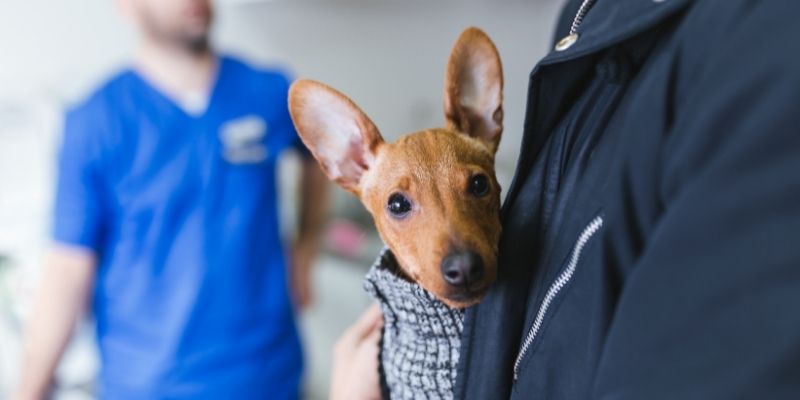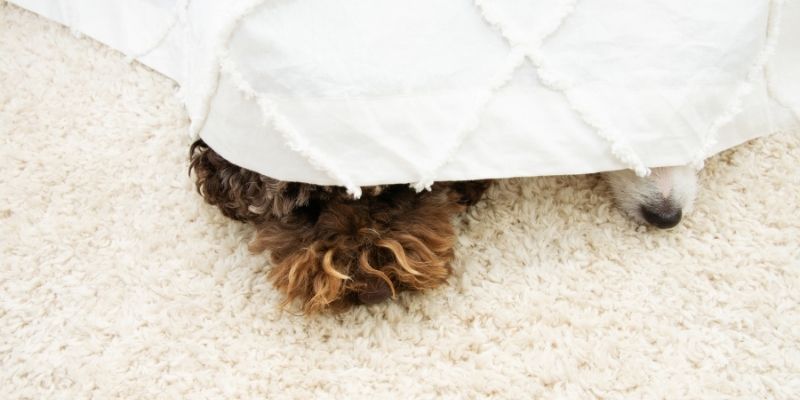Many animals, including our beloved pets, suffer from stress and anxiety just as we do. A recent study showed that 72.5% of all dogs display some kind of anxiety-related behavior. And it’s a serious matter because it seriously affects the lifespan of a pup, and not in a good way.
There are many methods to relieve your pet’s anxious feelings naturally, without the use of drugs and chemicals. Let’s look at all the natural remedies and interventions available to reduce or get rid of our pet’s anxiety.
Do you have a specific question about natural solutions for dog anxiety? Then use the table of contents below to jump to the most relevant section. And you can always go back by clicking on the black arrow in the right bottom corner of the page. Also, please note that some of the links in this article may be affiliate links. For more details, check the Disclosure section at the bottom of the page.
Here's what we'll cover:
What causes anxiety in pets?
Many things can cause pet anxiety. It may be the result of a traumatic event that they have experienced, or it can be related to one of their senses. For example, if your pet is uncomfortable with loud noises, he might become extremely anxious during a thunderstorm. Perhaps you left your dog at a pet hotel or a boarding kennel, and they have some anxiety in unknown situations where you are not present.

Your pet might become afraid of people or other animals after being attacked or abused by someone. Or he may have been in a fight with another dog and now fears all dogs.
Phobias are also widespread in dogs. Sometimes an event can trigger these types of phobias. For example, if your dog’s tail was run over by the neighbor when he was a puppy, it may cause him to fear all cars and trucks. Even if the pup didn’t experience any problems with it.
Separation Anxiety
Separation anxiety is the most common type of pet anxiety. Dogs with separation anxiety become very anxious when left alone, often becoming destructive and vocal. Likewise, dogs left with too little human interaction may become anxious when separated from their pack, including their family.
We all know that old dogs can become anxious when in new environments or exposed to other animals and people they don’t know.

How to Calm a Dog’s Anxiety Naturally?

There are many ways to help reduce our pet’s anxiety naturally. The secret is to experiment and see what works best for your dog. Pay attention to his behavior and body language, as this will allow you to find out just how anxious he is feeling at any moment.
If you have been trying certain supplements or activities but still don’t notice an improvement, then perhaps it’s time for another change! You know your pet better than anyone else, so trust your instincts and try different things until you find what relaxes him the most. Here are some things to try:
Exercise your pup
Exercise is a crucial part of reducing your dog’s anxiety naturally. It would be best to take your dog for long walks every day, especially after he becomes exhausted from playing with other dogs at the park. This will cause him to take a well-needed nap afterward! If the dog is older, you should take him for even longer walks to tire out his muscles so he can rest more comfortably later.
Make some changes in pet’s diet
You might also want to consider adding supplements to your pet’s diet, including essential fatty acids such as Omega-3 and Omega-6 (found in fish oil) to reduce his anxiety. These supplements have been shown to have a calming effect on dogs. But talk with your veterinarian before adding anything new to your pet’s diet!
Petting helps
Petting your dog during times of stress is very effective too. You will not only release calming hormones in his brain called endorphin. But you will also produce oxytocin which produces feelings of love and affection, among other things. If you are giving him a massage, make sure to use and follow the guidelines and steps outlined in the article: How to give your dog a massage.
Avoid Stressful Events
If your pet is afraid of loud noises, thunderstorms, or fireworks, then you must try to avoid these situations. If he can’t be with you on these occasions, you should choose a safe place for him, such as the bathroom or laundry room, where he can hide under the bed or in a closet until everything calms down. You should also play calming music in his room, so he knows it’s not scary out there!
Try Dog Appeasing Pheromones
Female dogs emit calming pheromones while feeding puppies. Similar synthetic pheromones are known as dog appeasing pheromones.
These pheromones, which come in a variety of forms, can help relieve anxiety in some dogs. You can choose from collars, sprays, and diffusers to find the ideal solution for your dog.
Does hemp oil work for dogs’ anxiety?

CBD oil has been claimed to be effective in treating canine anxiety by certain dog owners. CBD is a chemical present in cannabis and hemp that has been discovered to effectively treat a variety of health concerns in both dogs and humans. CBD oil has been reported to be useful in reducing canine anxiety in anecdotal reports from dog owners.
It’s worth noting, however, that while many humans use CBD oil to relieve anxiety, there is presently no scientific evidence on how CBD oil affects dogs.
Furthermore, because CBD products are not yet regulated, consistency and purity are not always guaranteed.
As a result, if you’re thinking about using CBD oil to treat your dog’s anxiety, you should talk to your veterinarian first. Your veterinarian can advise you on whether CBD oil is a good treatment for your dog’s anxiety. Or if potential side effects and hazards are not worth the risk.
What essential oils are good for dogs’ anxiety?
Try relaxing recipes like neroli, petitgrain, and lavender for general fear.
Lavender flowers and extracts have been used as a cure for anxiety and sadness for ages. Neroli oil, when inhaled, may aid in the release of serotonin and the reduction of cortisol, a stress hormone. Petitgrain Oil is commonly referred to as “Poor Man’s Neroli” since it is far less expensive than neroli oil while providing many of the same uses and advantages.
Calming dog compression hoodie

Calming coats and t-shirts deliver gentle, consistent pressure to a dog’s midsection, much like a baby’s swaddling cloth. It’s ideal for dogs who suffer from anxiety caused by travel, separation, noise, or strangers.
There are numerous brands and models to pick from, depending on the size of your dog.
Dog calming aid natural treats
Some chews could assist a recently fostered rescue dog cope with the stress of meeting new people, being in a new environment, and hearing new sounds. Look for items that contain ingredients like L-Tryptophan and chamomile, as these will help you feel peaceful and relaxed.
Best music for dog anxiety

Music therapy has been proved to benefit both humans and our canine and feline companions. Music can be soothing and relaxing whether you’re at home, in the car, or away from your pet. Music can also aid with noise sensitivity by blocking out distracting or frightening stimuli that can make certain dogs anxious.
Many dogs, according to studies, like classical music. Harp music, which is frequently utilized in hospice settings, is a natural sedative. You could try:
Collaboration of Lisa Spector and psychoacoustics researcher Joshua Leeds “Through A Dog’s Ear”.
Susan Raimond’s “Noah’s Harp: Surrender”.

Talk with your veterinarian about your dog’s anxiety

It’s crucial to remember that non-medical remedies won’t work for everyone. A combination of natural and medical therapies or solely medicinal solutions may be required to provide actual relief to a pet suffering from moderate to severe anxiety. Remember that a terrified pet who does not receive assistance is suffering, and their quality of life is jeopardized.
You may start identifying the triggers that cause your dog’s anxiety once you’ve learned how to notice when he’s worried. Make a list of the indicators you perceive, as well as the scenarios and circumstances in which your dog displayed them. Then make an appointment with your veterinarian to rule out any underlying medical issues and assist you in getting your dog the proper treatment.
When a pet’s behavior changes, it’s possible that physical issues in other parts of the body are at play. Diagnostic tests can be performed by your veterinarian to ensure that your pet is otherwise healthy.
In any situation, you should seek the advice of your veterinarian to ensure that you are doing everything possible to care for your dog. If no other cause can be identified, your vet may prescribe anxiety medication and/or refer you to a veterinary behaviorist.
Thanks for the blog graphics: Canva.com

Thanks for the blog graphics: Canva.com
Doghint.com is a participant of several affiliate programs. The list includes (but not limited to) the following: VigLink, Refersion, ShareASale, and Amazon Services LLC Associates Program, an affiliate advertising program designed to provide a mean for us to earn fees by linking to Amazon.com and affiliated sites. Doghint.com does not intend to provide veterinary advice. All published articles are meant for informational purposes only and not substitute the professional veterinary consultation.


